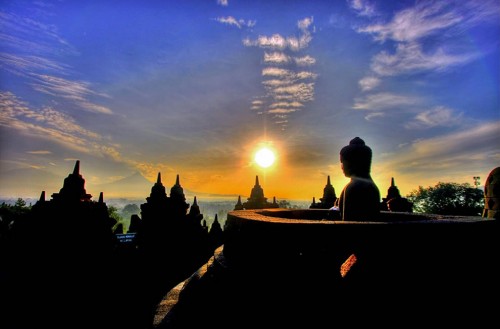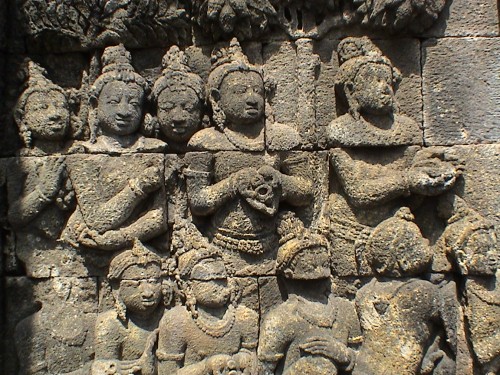Martin’s Question
5 Jun
Recently, Tsem Rinpoche shared another powerfully intellectual and yet practical teaching regarding the difference between the perception of an ordinary being and that of the Buddha or an enlightened being. I transcribed it for your reading pleasure. It’s a good thought-provoking read and if you have any questions, you can pop me one and I will do my best to answer you.
Rinpoche,
Is the state of enlightenment also an experience albeit a prolonged one? Or is the phenomenon of ‘experience’ altogether absent in that state? Does an enlightened being feel as human beings feel but with perfect understanding of that feeling? Or are feelings absent?
Thank you
Martin
—————
Enlightened beings do not experience per se like the way we do. They do not see something, like it, feel attached and from attachment, create grasping. Then, from grasping, create different mental states of aversion or liking and then, engaging in the act and from there, getting stuck in the act and becoming overwhelmed by the act. And then, being overwhelmed by the habituations of the act and further becoming caught up in the act, thus creating various karmas and then doing it over and over again.
So, therefore, an enlightened being does not experience the positive or negative from a deluded mind. When we experience things from a deluded mind, our experience can be positive or negative and then, grasping comes. In reaction to something ‘negative’, a grasping towards eliminating it ensues and then the actions that follows and then, the karmas that follows and then the repeat of the action which becomes the habituation and all the tumultuous states of mind that follows that action comes and then we are stuck in quicksand. When we see something we like, we grasp at it, the same thing happens afterwards except we desire more of it. So, enlightened beings definitely do not experience or grasp in that manner. They just perceive. When they perceive, it is without attachment because the deluded mind which arises from the ‘I’- consciousness or the ‘I’– grasping are not present.
In answer to your wonderful and very well-thought out question – therefore enlightenment is a permanent state. It is not a state to achieve. It is not a state to grasp at. It is not a state to be grasped. It is not a state to be looked for. It is a state already within us. So, it is not about achieving it. It is actually finding it for a lack of a better word. It is finding that enlightened state. So, when we find that enlightened state and to be in that enlightened state, we must eliminate the space that is already occupied, which is grasping onto a non-existing ‘I’, hatred that arises from that ‘I’, desire, fears, attachment, delusions, sensory grasping and all that arises from that non-existent ‘I’.
For example, if we remove someone’s eyes, ears, nose and we kind of nullify their nervous system, they won’t have their 5 perceptions. They can’t taste, touch, see and they can’t hear. Therefore, when someone is bereft or without their 5 senses, they can’t perceive. So therefore, ordinary sensory perceptions are also something that arises from the non-existent ‘I’. How does ordinary sensory perception arise from the non-existent ‘I’ because the non-existent ‘I’ has that element of non-existent ‘I’ and that denotes grasping. That grasping manifests in the sensory perception of I want this. I smell this. I hear this. I touch this. I desire this. I want this. So, when we have that kinda of grasping, it re-habituates ourselves to grasp at more.
When we have that grasping, it re-habituates us over and over until we reach a point where we cannot even hear, see, perceive, understand or listen to anyone or anything – the Dharma, a monk, a teacher, a friend or wisdom. We cannot hear anyone or perceive anyone teaching us otherwise. In that way, we are so caught up in our delusions. We are so caught up in our graspings. We are so caught up in our self- perceived ‘I’ and all that arises from it which is grasping, sensory perception, attachments, anger and hatred. We are so caught up in it and if we are told anything else, we will see that person or that doctrine as the enemy. We will see that as someone that disrupts, disturbs and destroys our peace of mind. Our false peace of mind.
Therefore, when we reach that point, we wish to escape from the Dharma. We wish to escape from the truth – Dharma or whatever we call as the truth. We wish to escape that truth. We wish to escape that meaning, that realization, that understanding and the institution along with the people, the doctrine and everything that has to do with it because it threatens our so-called false peace of mind. Why does it threaten our peace-of-mind? Because that peace of mind that we have is being enraptured or caught up in our habituations, caught up with our sensory perceptions, caught up in our graspings, caught up in our good or bad or caught up in our prejudices and that all arises from self-grasping ‘I’. So, when we do that in one lifetime and after 2 lifetimes and after 3 lifetimes, it is very difficult to escape. Hence, a blind turtle coming up a hundred years and having a ring slip through its neck is a very good analogy of the rarity of our samsaric situation to practice. And once we get Dharma and we have a chance to become better, we should never ever let it go and go back to it.
Hence, the analogy of the blind turtle and having a ring go through his neck is the rarity of hearing the teachings, hearing the Dharma and hearing the truth. Remember, the Dharma is hearing the truth, not in the sense that Buddhist Dharma is the ultimate truth but Buddha taught the ultimate truth. So that means that in his teachings, you have the ultimate truth. There is possibility there are other teachers and other masters, other manifestations of the truth that may come under different labels, different people, different ideas and in different types of outer appearances, different dimensions or different planets. It’s possible but right now, we have the Buddha manifesting as the Buddha in our world and the Buddha speaking the universal truth.
I would like to re-iterate that this truth of the self-grasping mind or the non-existent ‘I’ that creates the self-grasping mind that blinds us is not something Buddha made up or something that is indigenous of just Buddha’s perception. It is something that exists and because the Buddha became a Buddha by process of eliminating it, he was able to perceive it and to expound it and share with us. Therefore, when we come across such a rare doctrine, we should do everything we can – by fighting all the heavy torrential currents of the river, to go ‘upstream’ instead of ‘downstream’. That means to understand, practice and to put it into our minds because the chance is absolutely rare and it would not come again easily due to the explanation I just gave. I hope this helps a little bit. Thank you very much.
Sarva Mangalam.
All auspiciousness to you.
Tsem Rinpoche







No comments yet